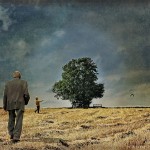 The 600s in Southern China. This place was considered a backwater, a place where uncivilized people lived.
The 600s in Southern China. This place was considered a backwater, a place where uncivilized people lived.
Huineng was a poor beggar in his 30s. He sold firewood to support himself and his mother, who was a widow.
One day, in the city, he heard a monk chanting a line from the Diamond Sutra, “Let your mind flow without dwelling on anything.”
Just upon hearing that he had a sudden experience of awakening. He desperately wanted to know more. He asked the monk what this line was and the monk explained that it was from the Diamond Sutra, that his teacher Master Hongren taught it to him at Huangmei.
Huineng became determined to go to Huangmei himself. In that moment he decided to become a Buddhist.
So, he left his life behind. It’s said that a mysterious benefactor offered to take care of his mother. Who knows.
He traveled to Huangmei and asked Hongren if he could be a student. This monastery had many monks doing various jobs. Huineng was accepted in and sent to join the kitchen staff as a rice pounder, the lowest job in the temple.
By the time Huineng arrived, Hongren was an old man and he wanted to appoint someone to take his place. It’s said that many monks lived there as his students. He devised a contest. He asked everyone to write a short poem expressing their insights into reality.
One of Hongren’s students, Shenxiu, was considered the best in the temple. Everyone thought he would win the contest, so no one else even tried.
He wrote this poem:
The body is like a bodhi tree
And the mind is a bright mirror.
Carefully polish it clean every day,
And let no dust on it.
Master Hongren praised this verse but he didn’t name Shenxiu his successor. Later, someone told Huineng the verse and he composed his own.
From the start, there is no bodhi tree
Nor stand of a bright mirror.
Buddha nature is ever pure;
Where can there be dust?
Shenxiu had expressed a logical approach to practice, purifying our minds. Huineng demonstrated a deeper understanding, an understanding at the heart of Zen.
For Huineng, Buddha nature is the true nature of all beings. It doesn’t need to be “purified”. Huineng suggests that we aren’t engaging in a practice of clearing or purifying our mind. Rather, we’re trying to shift our perspective so we can see our true nature.
Hongren called Huineng to his room and declared him the sixth patriarch in a private ceremony. He gave Huineng teachings from the Diamond and Lankavatara Sutras. Then, he sent Huineng away. He instructed him to go into hiding for a few years, until people were ready for the teachings again.
Huineng’s brief poem represents both the simplicity of Zen and the difficulty. We habitually want to use the mind to free the mind, but Huineng suggests we simply have to let the mind be.
This Zen requires no metaphysical or supernatural beliefs. Just a remarkably open mind.

















